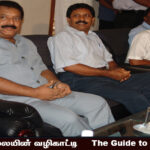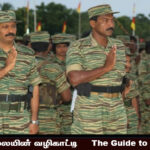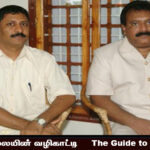

The Guide to Liberatio
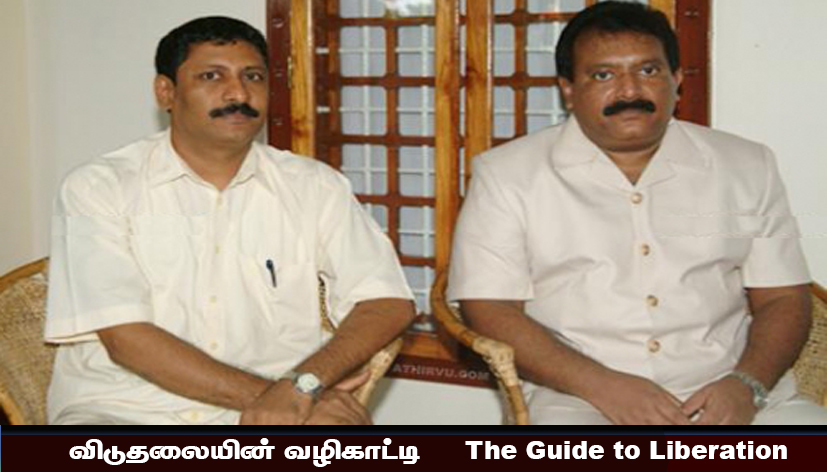
We continue our work with the pride of living in the time of our national leader who gave birth to our motherland. The first feeling when I was asked to do something for the leader’s fiftieth birthday was, “Should I write about the leader?”
At a time when the eyes of the nation and all concerned were closely fixed on him, the idea that sharing his qualities was the duty of the leader to convey the values of liberation to the completely ignorant was strengthened. On the strength of that concept, I am writing with a sense of pride about the leader.
Everyone will see the glory of the leader from every angle. Born from an ordinary family without any political background, he laid the foundation for liberation with his own political clarity, he worked as a leading fighter and commander in the field, mobilized and formed the liberation movement, and his activities are the beginnings of his history. His next achievement was the planning and implementation of field operations to mobilize the entire people behind the liberation struggle. It is the manifestation of his energy behind the unceasing conduct of the liberation struggle in every crisis encountered. The crown of his leadership for our liberation was his guidance so that our liberation war did not become a price for the aspirations and pressures of the world powers.
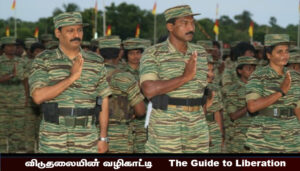 I believe that our leader gets the highest honour because of the pride of establishing before the world the philosophy of ‘self-struggle and self-strengthening’ as the way to the liberation of our oppressed and perishing race. It is obvious that our leader’s character is the reason for his high status. His innate virtues and the leadership qualities he cultivated in himself have revealed him to the world as a nation-builder of great political and military might. He began his public life as a fighter rather than as a leader. In other words, he spent a long time as a wandering young warrior seeking a mentor for his career. The maturity and knowledge he gained during that time has elevated him to the high leadership position of today. He observed the lack of a proper action plan in the leadership positions of that time. He also recognized their lack of commitment. They taught him many lessons. His leadership was shaped by those lessons. He was brought to leadership through the door of history rather than leadership being created.
I believe that our leader gets the highest honour because of the pride of establishing before the world the philosophy of ‘self-struggle and self-strengthening’ as the way to the liberation of our oppressed and perishing race. It is obvious that our leader’s character is the reason for his high status. His innate virtues and the leadership qualities he cultivated in himself have revealed him to the world as a nation-builder of great political and military might. He began his public life as a fighter rather than as a leader. In other words, he spent a long time as a wandering young warrior seeking a mentor for his career. The maturity and knowledge he gained during that time has elevated him to the high leadership position of today. He observed the lack of a proper action plan in the leadership positions of that time. He also recognized their lack of commitment. They taught him many lessons. His leadership was shaped by those lessons. He was brought to leadership through the door of history rather than leadership being created.
He found that the leaders of the student council and the youth council of that time, who were considered leaders, were leaders only in words. Their irresponsibility to bravely face the enemy’s breakthrough upset him. When they behaved in such a way as to disperse the struggle of organisation of that time, he was in a position to create a separate organisation. Even when he created and implemented a liberation organisation, he made another leader and kept himself as an activist without intending to be the leader. That synthetic leadership proved that a liberation struggle leadership should evolve naturally. Artificial leaderships were identified and removed when the dignity of a liberation movement was undermined for their individual weaknesses and norms were dispersed. At that time, he offered to guide the liberation.
So he was brought to the leadership position. We can proudly say here that our leader is an example of prophetic vision required for leadership. That was the time when the Indian government representatives gave arms training to our Tamil Eelam freedom fighters. In late 1983 we were training in the mountainous terrain of northern India. An Indian army officer who was a training instructor there took great care in our training matters and personal care to face the cold conditions we were not used to.
The officer in question had established a close emotional relationship with many of us, including Kittu Anna, who was next to Ponnamman, who was in charge of all the trainees. The Leader visited our training camp and observed the exercises. At that time, the leader was quietly listening to what many of us had to say about the officer in question and his concern for us. A meeting of the Leader with the elected officials was arranged that night. I still remember his words vividly. That is, ‘India is acting in its own selfish interests – in fact we have to fight for our own freedom. If we as fighters are thinking that India will get our freedom, it will weaken our freedom struggle. Therefore, the opinion of the leader was that ‘instil confidence among the fighters to fight for our freedom without relying on India’. India will not get our freedom. His prophetic thought that we will have to fight for our freedom one day may be the basic source for our freedom struggle to stand in its own time and not perish during the crisis.
He had clearly thought about all the stages of our freedom struggle, not only depending on the condition of India but the trend of our freedom struggle, the attitude of Sinhalese politicians towards our freedom struggle and how to mobilize people for our freedom struggle. He also envisioned how the future structures should be. There is no doubt that our leader is a politically shrewd diplomat. Some who unquestioningly accept that the leader is a salesman in military matters, consider the leader to be unskilled in political matters. That idea is very wrong. Today in Vanni, there was an environment where representatives of the world come and go to interact with our liberation movement administrative units and people who are working with a governmental majesty.
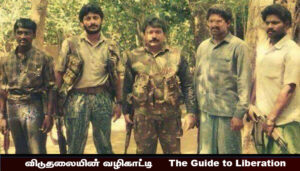 It was a political victory. The enemy continued the protracted Jayasukkuru occupation operation while the heat of the military crisis that caused our movement to retreat from Jaffna subsided. It was the leader’s military success that changed the situation of military setback faced by our movement in the late 90’s. It is the outcome of our leader’s diplomatic move that the military victory has been turned into the aforementioned political victory and the view of our liberation war has been moved to the international level. The leader’s knowledge is very high in keeping a clear understanding of the century-long political history of the country and in knowing the history of all the liberation struggles that have taken place in the world and in having knowledge of the negotiations that determine the life and development of countries and movements. India’s former Prime Minister, Rajiv Gandhi, during his time in handling our liberation war in his favour had given India a lot of political opportunities. Senior political leaders and Rajiv Gandhi, who are still sitting on the power chairs of India today, tried to portray our freedom struggle and leadership as a ‘little mess’.
It was a political victory. The enemy continued the protracted Jayasukkuru occupation operation while the heat of the military crisis that caused our movement to retreat from Jaffna subsided. It was the leader’s military success that changed the situation of military setback faced by our movement in the late 90’s. It is the outcome of our leader’s diplomatic move that the military victory has been turned into the aforementioned political victory and the view of our liberation war has been moved to the international level. The leader’s knowledge is very high in keeping a clear understanding of the century-long political history of the country and in knowing the history of all the liberation struggles that have taken place in the world and in having knowledge of the negotiations that determine the life and development of countries and movements. India’s former Prime Minister, Rajiv Gandhi, during his time in handling our liberation war in his favour had given India a lot of political opportunities. Senior political leaders and Rajiv Gandhi, who are still sitting on the power chairs of India today, tried to portray our freedom struggle and leadership as a ‘little mess’.
He led the liberation war with political wisdom that kept our liberation struggle from sinking in those political pressure weeks. Some people tend to think of the lack of political wisdom as the characteristic of the leader who did not give up even when the liberation struggle faced political bottlenecks and military crises. In other words, the leader does not make concessions based on the political wisdom they possess.
Our leader will understand terms such as diplomacy, principled commitment, surrender etc. with their correct meaning dimensions. He would point out with anger and sarcasm that those who lack principles and bow to the enemy or seek concessions for the rights of the race hide behind the term diplomacy to justify their actions.
A leader who refuses to give up the interests of our nation, his commitment to policy is the result of his political clarity. From time to time, the leaders who appeared among our people did not have a decisive vision of ethnic liberation. It is somewhat true those political leaders were enlightened by reflecting the feelings of the people of that time and concentrating the upheaval of the people. Yet they lacked the vision to prepare the people for the journey towards true liberation or the commitment to lead the liberation struggle. Instead, their politics was to agree with those who have enslaved us. At a time when the freedom feelings of our race were raging, the aggressors were making personal compromises with the men who were the leaders. Our leader is not aware of the name of diplomacy, which is a victim of the occupiers’ tactics and gives up ethnic liberation.
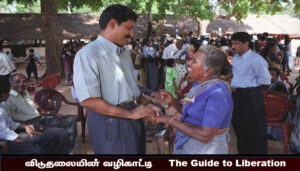
Our leader does not know that diplomacy is the name of aiding the enemy by participating in negotiations or elections for a trivial solution in order to dull the feelings of liberation of our people which was growing. Our leader is good at diplomacy if the name of diplomacy is to make the commitment to the principle of liberation the primary thought and to seek friends to act independently for that ideal.
Along with the concept of the liberation struggle and the state’s political movements during it, an assessment of the period is also necessary. Our leader is an expert in this diplomacy if it is diplomacy to analyse and calculate these emotional lines. Some of the manifestations of the Leader’s diplomatic moves are the early training sites in India, friendly relations with Tamil Nadu Chief Minister M.G.R. and talks with Sri Lankan President Premadasa during the Indian military occupation.
The friendships that resulted from that diplomatic move is his personality that does not allow us to ask for the rights of our race at a price. Leaders can clearly discern the line of separation they have drawn for themselves between policy commitment and diplomatic manoeuvring. I have seen that he interacts with many people who are personally hostile to him. Even the above habits, which do not leave room for them to consider themselves based on personal interest, are another side of his diplomatic personality. The secret of his personality is his commitment to the liberation of the race. From time-to-time severe crises occur in the course of the protests. Leaders do not tolerate dishonesty or deceit in dealing with such crises and in any work done to meet those crises. That was the situation before Captain Miller took to the field as a black tiger.
It must have been early 1985 when the movement did not begin to destroy even the smallest camp. Attacking an army camp at that time would be a huge victory for Eelam’s struggle. A plan was drawn up by the field officials. The military camp was located on the side of the road where private vehicles could pass with little inspection. A civilian’s vehicle that was regularly passing through the army camp was used to do regular inspection of the army, it was possible for that vehicle to pass through without inspection.
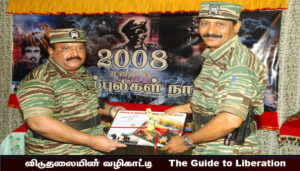 Observing this, our people planted a bomb in the vehicle without the driver’s knowledge, and the plan was to detonate the bomb by remote control when the vehicle was passing through the military camp, wreak havoc on the camp, deploy an additional team, and capture the camp. As soon as the leader came to know about the plan, he suspended the plan. He strongly condemned the idea of planting a bomb without the knowledge of the driver and said that ‘If you have a brave person among you, you can carry the bomb and detonate it with the mindset of self-destruction.’ After that, for a while, he often took the wrongness of this plan to the officials and he was of the opinion that unreasonable plans should not be made to get easy wins. It was a critical period during the Indian military occupation. The traitors stood by knowingly and unknowingly the Indian treachery that peddled meaningless half-measures. They claimed to be descendants of Thanthai Selva (A senior political leader who formed and lead the TULF party) who said, ‘Only the Lord should save the Tamil nationality’. They could not stand by the side of the younger generation who are fighting with their blood for the liberation of Tamil. They did not want to stand aside and let the Lord save them. Instead, they dared to support the side of the occupying aggressors. It is inevitable to remove the traitors who dared to betray the freedom struggle in the lust for office. The operatives, whose only thought was to exterminate the traitors, went astray. Failing to get a suitable opportunity for action, they arranged a rendezvous and launched an attack there.
Observing this, our people planted a bomb in the vehicle without the driver’s knowledge, and the plan was to detonate the bomb by remote control when the vehicle was passing through the military camp, wreak havoc on the camp, deploy an additional team, and capture the camp. As soon as the leader came to know about the plan, he suspended the plan. He strongly condemned the idea of planting a bomb without the knowledge of the driver and said that ‘If you have a brave person among you, you can carry the bomb and detonate it with the mindset of self-destruction.’ After that, for a while, he often took the wrongness of this plan to the officials and he was of the opinion that unreasonable plans should not be made to get easy wins. It was a critical period during the Indian military occupation. The traitors stood by knowingly and unknowingly the Indian treachery that peddled meaningless half-measures. They claimed to be descendants of Thanthai Selva (A senior political leader who formed and lead the TULF party) who said, ‘Only the Lord should save the Tamil nationality’. They could not stand by the side of the younger generation who are fighting with their blood for the liberation of Tamil. They did not want to stand aside and let the Lord save them. Instead, they dared to support the side of the occupying aggressors. It is inevitable to remove the traitors who dared to betray the freedom struggle in the lust for office. The operatives, whose only thought was to exterminate the traitors, went astray. Failing to get a suitable opportunity for action, they arranged a rendezvous and launched an attack there.
The leader was shocked and saddened when he heard about the attack. Action should have been taken with honest bravery. Instead, arranging a meeting for discussion and choosing to attack that meeting is a very wrong approach. This approach has tarnished our movement. “This is not the heroic approach that our fighters should follow. This approach should never have been allowed. These things have happened against the morals of our liberation movement,” he said repeatedly. No warrior would have dared to think of such a plan after listening to his explanation of valour and pure valour in words and sentiments. Many years have passed since the events took place. Yet in conversations about new attacks, he points out the above-mentioned misapprehension. His anguish at that unethical approach and his expectations of what our movement should be will be revealed then. It seems that this honesty of the leader is giving the spiritual strength for the development of our movement. In other words, it is his integrity that does not allow his conscience to be tarnished in the slightest, which forms the personality for the leadership of Tamil Eelam.
From time to time the leader takes the lead in self-imposed restrictions introduced by the exigencies of the freedom struggle. The care he takes to ensure that no one, in particular, obtains special privileges, will give great encouragement to the enforcers of the said restrictions. I remember one of the rare occasions when I saw the leader upset. This was about ten years ago. A person who had failed to obtain a permit to travel out of our movement control area had attempted a shortcut through someone close to the leader. Even when the said application for a concessional recommendation was brought to his attention as the closest sheep, the leader refused to grant it. Although the anger or anxiety of the person receiving the rejection was personally disturbing even to him, he never agreed to make a recommendation for the application.
The leader grants us many recommendations and sometimes urgent orders if it amounts to any contribution to the struggle or even because of his general social outlook. However, the Leader categorically refused to make his recommendation on the application on the ground that the applicant for travel permission was not suitable for the above matter.
Due to such strictness, the leader has often lost relationships with many personal friends. He considers his strengths to be impartiality resulting from clarity of ideals and personal integrity. As a result, he does not regret these friendship losses and is proud of his honesty. He has developed the characteristic of accepting everyone who comes forward to fight or contribute to the struggle for the liberation of the motherland as his relations.
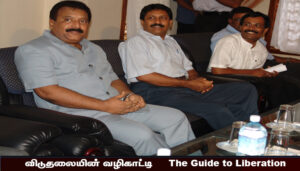 In other words, it is the nature of not getting stuck in the circle of personal friendship and relationship that has made a race rally behind him. Everywhere the earth is bathed in the light of the sun. As it moves closer to the same sun, it emits not only light but also heat. Likewise, those who are close to our leader not only receive his cold light, but also receive hot rebuke or anger. He cannot change or forget his anger towards those who hold power and use it unjustly. The leader continues to emphasize that the misuse of power by those who hold it is the cause of many problems and that if the attitudes are adjusted, the solutions will be found. The leader has faced the wrath of the public many times while receiving complaints about intelligence officers who approach the public with an authoritarian tone. It is only when such sentiment is expressed that the intelligence structure created by power and money will be destroyed over time. He presented the guiding concept that the structure created by a loving attitude and fostering a sense of liberation will endure over time. We can see our leader’s expressions of such anger as expressions of his principles of liberation.
In other words, it is the nature of not getting stuck in the circle of personal friendship and relationship that has made a race rally behind him. Everywhere the earth is bathed in the light of the sun. As it moves closer to the same sun, it emits not only light but also heat. Likewise, those who are close to our leader not only receive his cold light, but also receive hot rebuke or anger. He cannot change or forget his anger towards those who hold power and use it unjustly. The leader continues to emphasize that the misuse of power by those who hold it is the cause of many problems and that if the attitudes are adjusted, the solutions will be found. The leader has faced the wrath of the public many times while receiving complaints about intelligence officers who approach the public with an authoritarian tone. It is only when such sentiment is expressed that the intelligence structure created by power and money will be destroyed over time. He presented the guiding concept that the structure created by a loving attitude and fostering a sense of liberation will endure over time. We can see our leader’s expressions of such anger as expressions of his principles of liberation.
In all cases, his expressions of thinking only about the liberation of our race or refusing to think about anything other than the work for the liberation of Eelam are revealed. We will rally behind our leader who acts as a guide not only by words but also by life. It is the duty of Tamilians to rally in the path of commitment to liberation under the guidance of our leader. It is the responsibility of everyone who joins under his leadership to understand his thoughts and ideas and work to hasten liberation. I am proud to join the voice of the Tamil nation in congratulating with pride and confidence on the fiftieth birth anniversary of our leader who set his life as the guide of liberation.
“The Tigers Thirst is The Tamil Eelam Motherland”
S. Pottu
In-charge of Intelligence,
LTTE,
Tamil Eelam
